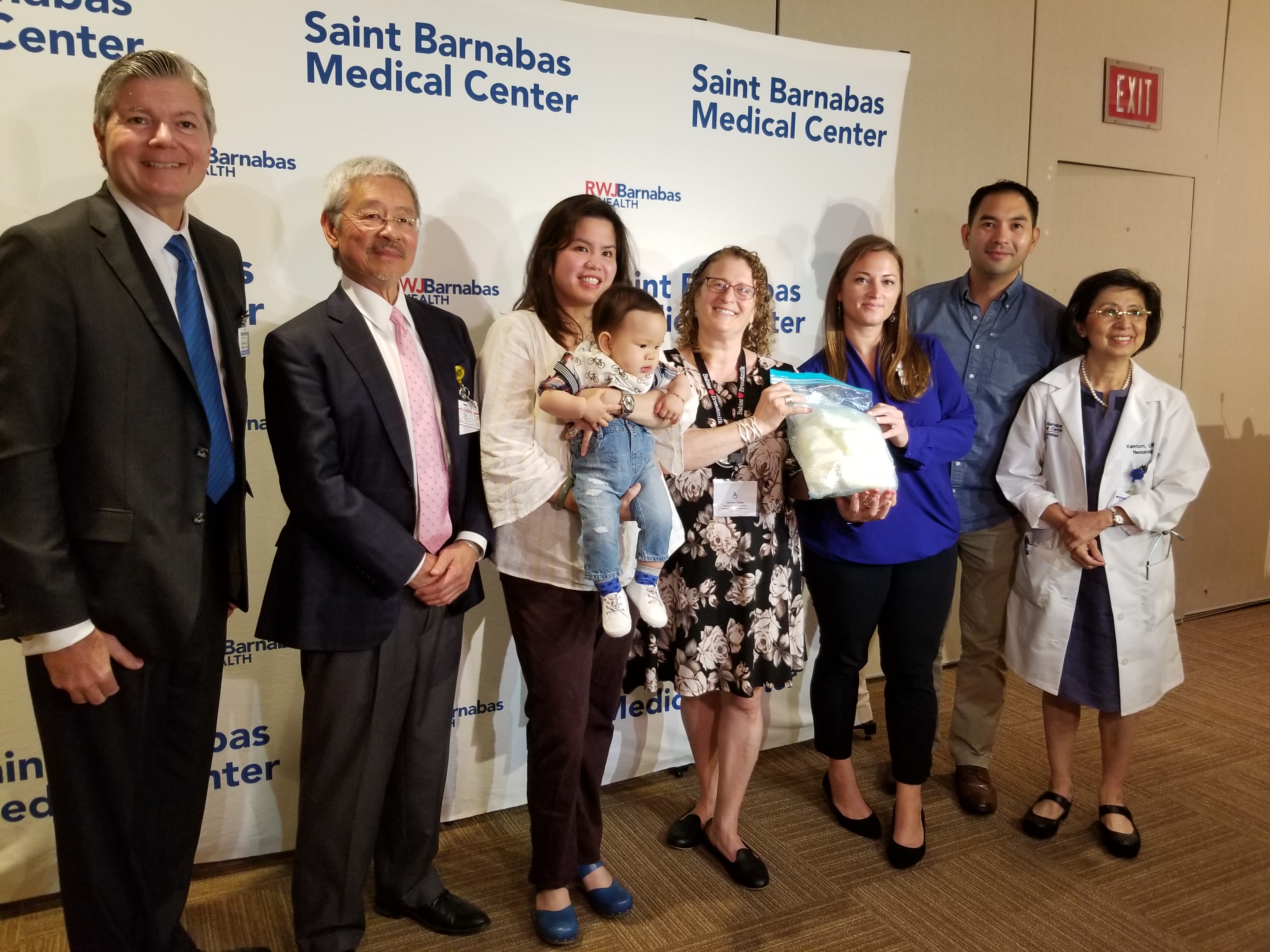A human milk depot allows all new mothers to offer safe, nutrient-rich breast milk to their babies.

At the grand opening of the Human Milk Depot in August, from left to right: Stephen Zieniewicz, President and CEO, Saint Barnabas Medical Center; Timothy Yeh, MD, Chair, Department of Pediatrics at SBMC: Gidget Romero and baby Gino; Cynthia Cohen of Mothers’ Milk Bank Northeast; Kim Rosales, MSN, RN, Clinical Director of Family Centered Care at SBMC; Nino Romero; Kamtorn Vangvanichyakorn, MD, FAAP, Director of the NICU at SBMC.
For Gidget Romero, RN, of Belleville, the road to motherhood was not without bumps and detours. A pregnancy in 2013 ended in miscarriage and was followed by trouble conceiving and treatment for infertility.
In 2018, just as she and her husband, Nino, were feeling like they might never have a child, they were elated to learn that they were once again expecting. Then, during a routine ultrasound at 24 weeks, doctors discovered a tumor on Gidget’s placenta. It was equal in size to the baby, and so close to the umbilical cord that it could potentially restrict the vital oxygen and nutrients supplied by the cord. Additionally, Gidget had developed gestational diabetes.
Given these concerns, Gidget and Nino wanted to become more familiar with the Neonatal Intensive Care Unit (NICU) at Saint Barnabas Medical Center (SBMC), where she works.
During the tour, Gidget overheard a nurse talking about how breast milk could prevent necrotizing enterocolitis (NEC), a potentially devastating disease that affects the intestines of premature babies. Speaking with parents of preemies that day, she thought, “The one thing I want for these parents is for them to enjoy their baby at home, just like we are hoping to do.”
Paying It Forward
Gidget carried her baby safely to term, but the message about the value of breast milk stayed with her. It was at the forefront of her mind several months ago, when SBMC became the first hospital in New Jersey to open a human milk depot in partnership with nonprofit agency Mothers’ Milk Bank Northeast (MMBN). Now, nursing moms who are producing more milk than they need can give other babies a chance to receive breast milk by donating their surplus to MMBN.
Front and center at the opening reception was the Romero family—Gidget, Nino and baby Gino. In fact, Gidget was SBMC’s first Milk Depot donor, contributing 150 ounces.
“All babies benefit from human milk with rare exceptions, but for medically fragile or premature infants, breast milk is even more critical. In times when a mother is unable to provide enough of her own milk, the next best option is pasteurized banked donor breast milk,” says Kamtorn Vangvanichyakorn, MD, FAAP, Director of the NICU at SBMC. Because breast milk contains the optimum nutrients for a baby and is gentle on the baby’s system, the American Academy of Pediatrics recommends exclusive breastfeeding, if possible, for the first six months.
The medical center is expanding a program that has already seen success. “We’ve been offering donor breast milk in the NICU for many years, and it really helped to improve the outcomes for the preemies,” says Kim Rosales, MSN, RN, CNML, Clinical Director of Family Centered Care. Ten years ago, SBMC began providing only breast milk to all babies born before 33 weeks’ gestation. With that, the NICU saw a dramatic decline in cases of NEC, down from nearly 10 percent of babies to less than 2 percent.
Now, thanks to the MMBN partnership, SBMC is able to provide banked breast milk for even more babies. “We’ve expanded our donor milk program to the newborn nursery so all moms have that option and can benefit from breast milk,” Rosales says.
Safety First
Concerns about the safety of donated breast milk were a driving force behind SBMC’s decision to open the Milk Depot. Lactation consultant Sara Rieber, MSN, RN, APN-C, IBCLC, reports that the hospital’s Lactation Department undertook a research project about the selling of breast milk online. “What we learned is that, in New Jersey specifically, there is an endemic crisis of women selling their breast milk online, on Facebook and on Craigslist, and most of it does not meet safety guidelines and standards,” she says.
Lactation consultant Suzanne O’Neill, BSN, RN, IBCLC, explains that MMBN has strict procedures to ensure that the donated milk is safe. For starters, all donors are screened through a process that includes a phone call and bloodwork. After a donor is screened, she can drop off her breast milk at SBMC and the hospital will ship it, frozen, to MMBN in Massachusetts. Once it gets there, O’Neill explains, MMBN pasteurizes the milk to destroy any harmful bacteria. The milk is then tested for safety, refrozen and sent to hospitals throughout the country.
With the help of Gidget and many women like her, the Milk Depot at Saint Barnabas eliminates safety concerns, as well as the emotional concerns of new moms who are worried about not being able to provide breast milk for their babies.
“When we heard about necrotizing enterocolitis, my husband and I felt like we needed to do something. We have this blessing and just want to pay it forward somehow,” Gidget says. “I happened to have overproduction of milk, and when I heard about milk banking, I was on board. I couldn’t be more excited to donate.”
Mothers who wish to donate milk can review guidelines on the milk bank website, www.milkbankne.org/donate, then contact a Donor Intake Coordinator for screening at 617.527.6263, ext.3 or donate@milkbankne.org to get started.